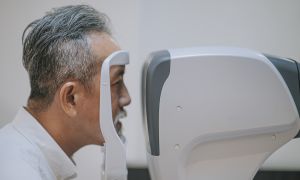Advertisement
The healing of a corneal ulcer depends on many factors. One of the most important factors that determines the speed with which an ulcer heals is the organism that caused the ulcer. Pseudomonas is a common organism associated with contact-lens wear and may delay re-epithelialization considerably. Hence, an answer to your question is difficult and cannot be answered with a one-size-fits-all answer. I will give you some general considerations, however, but you should discuss this more with your eye doctor because this depends on a lot of different factors such as your age, infectious organism, systemic conditions, corneal sensation, current medications, and allergies. In general, I would suggest that you abandon contact lenses altogether. If your contact lens was related to or the cause of your infection, you may get another infection, and be left with a cornea scar that may be very difficult to treat. If you are willing to take the risk of corneal blindness or worse from a contact lens, at least request that you be fit with a gas-permeable contact lens. If you believe that you cannot tolerate a gas-permeable contact lens, at least don't wear your soft contact lenses overnight. If you still decide to wear your lenses after my recommendations to the contrary, I would want you to wait until the eye had completely healed and was completely white and quiet. That could be as little as three months to one year, depending on the many factors I mentioned above. If you wear your lenses sooner than that, you risk recurrence of your infection, breakdown of your surface cells called epithelium, leading to poor healing, worsening of the scar, and continuing and intermittent abrasions of the surface. Basically, I would tell you not to wear your lenses until your eye doctor tells you it is OK to do so. Then I would also consider my advice above about the discontinuation of lenses altogether.
Continue Learning about Eye and Vision
Important: This content reflects information from various individuals and organizations and may offer alternative or opposing points of view. It should not be used for medical advice, diagnosis or treatment. As always, you should consult with your healthcare provider about your specific health needs.




